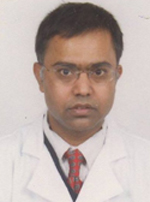Dr. Shahab Uddin
UAE Awards
Hamdan Award for Original Research Paper Published in Emirates Medical Journal
2005-2006
Dr. Shahab Uddin was born in a small village, Mohammad Pur, District Azamgarh, India, in 1963. After completing his Delementary education from village Madrasa and secondary education from a local school, he joined Aligarh Muslim University. He majored in chemistry for his undergraduate degree and Biochemistry in his postgraduate studies.
He received M.Phil and Ph.D. degree in Biochemistry from the Department of Biochemistry, Aligarh Muslim University. In 1989, he went to United States of America on a postdoctoral fellowship at Ohio State University, Columbus where he was .involved in a project related to genotoxins y induced DNA damage in human cells. In 1991, he joined Loyola University of Chicago as Molecular Biology Program Fellow and worked on several projects including the molecular basis of alcohol effects on pituitary hormone and Interferon mediated signaling in malignant cells. In 1996, he joined the Department of Medicine at the University of Illinois at Chicago as research faculty and worked on Interferon induced-inhibition cancer cells. His research discovered several novel-signaling functions of interferon including role of p38 map kinase in interferon mediated signaling pathway.
In 2001, he moved to University of Chicago, where he continues working in the area of signaling pathways in malignant cells. During his tenure in United State, he had published more than 80 peer-reviewed papers published in Proceedings National Academy of Sciences, Journal of Biological Chemistry, Journal of Immunology, Blood, and Molecular Cellular Biology.
He has also presented several of these findings in international conferences and meetings. He has received funding from several agencies such as American Cancer Research, Wendy Will foundation as PI and from NIH and Myeloma foundation as Co-investigator. Currently, he is working as a Senior Scientist at King Faisal Specialist Hospital and Research Center.
In his award winning paper published in the Emirates Medical Journal, Dr.ShahabUddin Khan showed that curcurnin, a plant has a good anti-cancer effect.
There is an intensive effort ongoing in science to prevent or cure malignancy. The older generation of antineoplastic drugs. Prevention of cell proliferation, inhibiting neovasculogenesisand promoting apoptosis are key mechanisms of numerous chemotherapeutic agents currently in the market. Despite their therapeutic value, most of these drugs have serious side effects. The search for new drugs therefore includes efforts to identify commonly consumed food-derived chemicals which might be of therapeutic value, most of these drugs have serious side effects. The search for new drugs therefore includes efforts to identify commonly consumed food-derived chemicals which might be of therapetutic value for cancer patients. Curcumin (diferuloylmethane) a natural compound isolated from the plant Curcuminlonga, has been shown to possess potent anti-tumour and anti-oxidative properties. The mechanism by which circumin initiates apoptosis remains poorly understood. In the present study, the effect of curcumin on the activation of apoptotic pathway in humanlymphoma cells was investigated. Curcumin induces apoptosis in several primary effusion lymphoma (PEL) cell lines of B cell origin via inhibition of constitutively active AKT/PKB and subsequently loss of mitochondria membrane potential and activation of capase-3. Pre-treatment of these cells with N-acetylcysteine, a scavenger of oxygen radical markedly prevented cell proliferation, apoptosis, de-phophorylation of AKT, loss of mitochondrial membarane potential, activation of caspase3 and inhibition of XIAP suggesting a role for reactive oxygen species in this process. Altogether, these findings suggest a novel function for curcumin, acting as a suppressor of AKT activation in B-lymphoma cells by generating oxidative metabolites, leading to inhibition of proliferation via induction loss of mitochondrial membrane potential and caspase-dependent apoptosis. Therefore, curcumin may have a future therapeutic role in lymphoma and possibly other malignancies with constitutive activation of AKT.
Dr. Uddin et al have published a series of papers on topics related to this subject in journals of major impact. Their ENU paper is an excellent one and the results may have a major impact on therapy of cancer in the future. Therefore this paper is considered worthy of the EMJ Award 2006.

